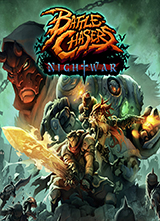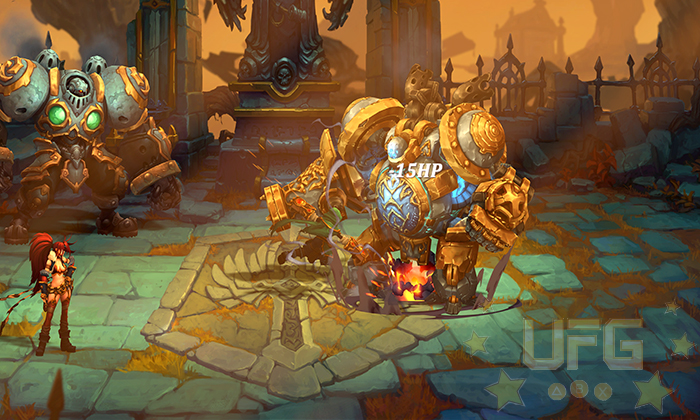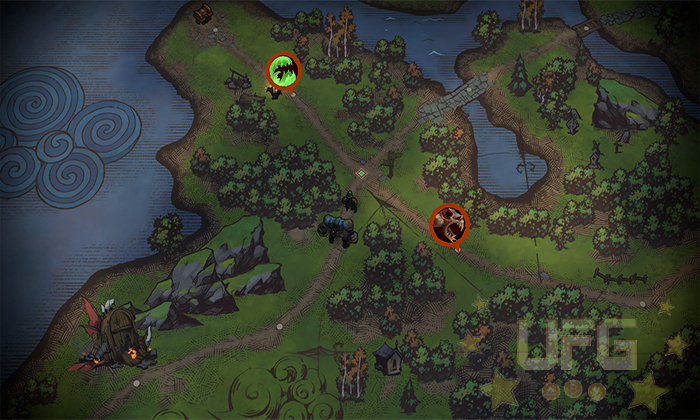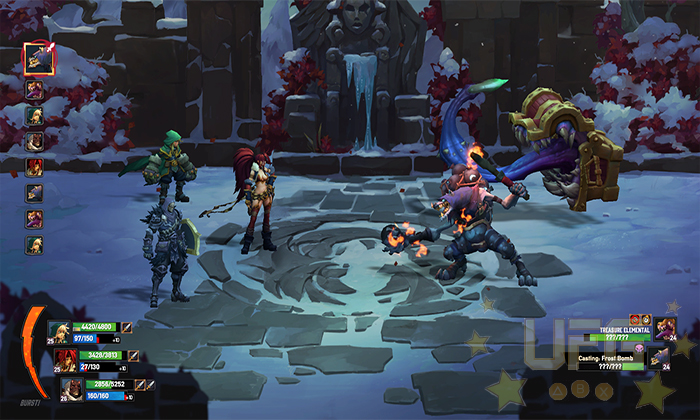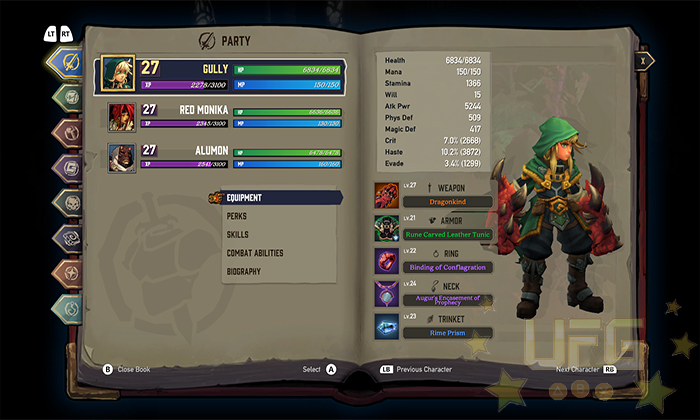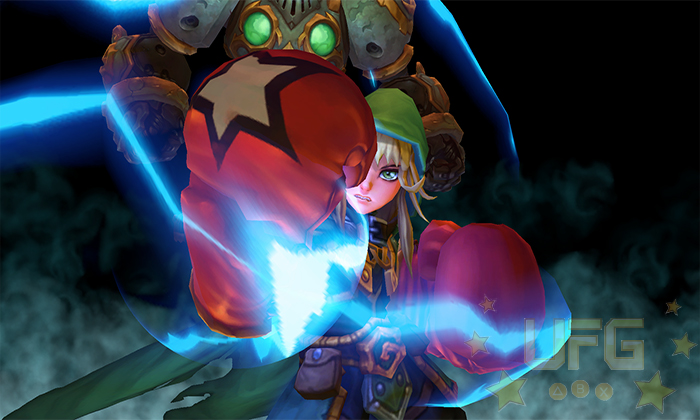Battle Chasers: Nightwar
It takes a skillful developer to balance nostalgic gameplay mechanics with modern elements, classic remakes notwithstanding. The idea is to bring back what was entertaining while eschewing the flaws and poor design choices that the industry has outgrown. This is something I’m sure Airship Syndicate, which is made up of ex Vigil Games employees, are capable of. Unfortunately the quality of their first title, Battle Chasers: Nightwar doesn’t seem to showcase this ability.
Based on the fantasy comic book series Battle Chasers, Nightwar acts as a spin-off of sorts. It still follows the story of Gully, a little girl whose father leaves her with magical gauntlets after suddenly disappearing one day. It doesn’t continue the arc established in the comic though. Instead, Gully and her companions are shot down over a mysterious island by a band of pirates. Their case of “wrong place at the wrong time” turns into a lengthy adventure, featuring magical artifacts, ancient cults, and powerful monsters.
The premise is decent. Fans of the comics will be right at home, recognizing favorite characters like the swordsman, Garrison. Newcomers aren’t left in the dark though. There’s just enough information to get them invested despite not being aware of what happened prior. Regardless of what camp you reside in, the early goings should be intriguing; the questions surrounding Gully’s attackers and an evil sorcerous keep the wheels spinning for a few hours. The plot does start to run dry after a while though. Without giving too much away, things go from trying to find or rescue missing companions to stopping Destra (the sorcerous) from resurrecting powerful enemies. The game essentially has you chasing this one person all over the island, going from one boss fight to the next, with very little to go on. Stopping her from unleashing an unstoppable force upon the world isn’t the worse goal to have, but that alone doesn’t create a compelling story.
The cast of characters are interesting to say the least. Though our heroes fit nicely into the normal RPG roles – the rouge, warrior, mage and so on – they can be rather charming. Conversations had during overnight stays in a local inn offer background information, elevating the group above walking stereotypes. The overall plot doesn’t do much with these characters though. It would be nice to hear more about Garrison’s demons or to learn more about his ties to Gully’s father. Instead we get light banter right before a battle, decent fireside chats, and some implied motives – great literary devices to have when introducing these characters, but nothing that would lead to any real character growth.
It’s a shame really. Battle Chasers: Nightwar is a lengthy game, as most turn-based RPGs tend to be. One would assume that there was plenty of time to present a more fleshed out story. Especially, with Joe Madureira, the creator of the comic series, as the CEO/Creative Director at Airship Syndicate. Expectations aside, what made the surface level plot harder to endure was the grindy gameplay. As you go about hunting down Destra, you’ll end up trekking to new areas that continually introduce opponents several times stronger than your crew. Surviving these encounters can be tough, prompting a return to a previous location to level up. Unfortunately, none of the enemies you’ll face offer much in the way of experience points. Even after successfully taking down a large group of monsters that were three levels above me, I got maybe 500 xp for my trouble. Which wouldn’t be bad if that number wasn’t divided between my chosen heroes; it took thousands of points to level one of them, let alone my entire three-man party. The absence of true side quests doesn’t help either. There are special bosses you can fight via hunts that offer decent loot and a ton of coins but very little experience. Outside of rare cases where defeating one can unlock a new Burst (more on that later), fighting them wasn’t very beneficial.
Other design choices add to this problem. Items in shops cost a lot of money but coins aren’t dropped very frequently from dispatched opponents. Dungeon interiors are randomly generated each time they are beaten. Not completely, as each room is mostly the same, just placed in a different order while housing different items. This includes forges used to craft better gear. Meaning that unless you forgo completing a dungeon once a forge was found, you’d have to go back and search for another in these randomized areas to craft. That is until you can upgrade one of your shops to include one in the main town. But then that goes back to the lack of coin issue. Certain hunts (the only thing resembling side quests) can only be started by obtaining an item that randomly spawns in a particular dungeon. And because the dungeons interiors are randomly generated…well, you can see where I’m going here. Money, experience, crafting stations, even the means of doing a side quest can be hard to come by.
In order to complete Nightwar, I had to grind completed dungeons over and over. Some of which had to have their difficulty settings raised so I could potentially get better loot. I hunted nearly all of the special bosses, equipped two of the most powerful items in the game (I unlocked Gully and Red Monika’s legendary weapons) and I still had trouble leveling up enough to face the game’s final bosses. While I certainly felt accomplished by the time the credits rolled, that feeling was overwhelmed by my need to be done with the game. The adherence to old RPG staples, mainly the grind-heavy gameplay, bleeding into most of the game’s mechanics sucked out all of the fun. And given Airship’s announcement of a patch to adjust these balancing issues, it would seem that I wasn’t the only person complaining. Add in some glitches – one of which that often crashed the game right before a certain boss fight – long load times and frame rate issues and perhaps one can understand why I wanted to cut my time with this game short.
Of course, there were some highlights. Little things like no random enemy encounters, a cool system that rewards you for finding/reading lore, and a great turn based combat helped to stave off some gameplay fatigue. I especially enjoyed all of Nightwar’s strategic elements, including the awesome “overcharge” mechanic that allows you to build extra energy for casting strong abilities. This is tempered by a turn-based system that changes a character’s position on a time line based on how they attack. It works like this: normal attacks are instantly executed when picked. Though they are weaker than special abilities, they provide overcharge per use. This overcharge provides a buffer to your mana pool and is used first when performing certain moves. So instead of using 20 mana points to heal your party or summoning lighting, you’ll use however many points of overcharge you’ve built up first. Ideally, you’d want to use a few normal attacks before a stronger one in order to save mana. That changes if you’re in dire need of something (like a heal).
Regardless of what you choose, the time it takes to act must be considered. The strongest moves usually take the most time, pushing a character further down the line – enemies who might have attacked after Gully completed her turn, can do so beforehand. Sometimes it’s better to go last though. When an enemy starts casting an ability, like you, they’ll be repositioned on the time line. This is because it takes a turn to set up these larger moves and another to unleash them. Using a stun ability will stop them from casting, wasting their second turn. Meaning that they’ll need to take two more turns to attack if they choose to do that move again.
Then there are the Bursts. These are powerful moves that can change the tide of battle – like the limit breaks from the Final Fantasy series. Taking and receiving damage slowly builds a burst meter. Each level of the meter allows for a different Burst per character. These moves are great because not only are they really strong, they are also performed instantly. Everyone in your party shares from the bar, so if one character uses all three levels during their turn, you’ll have to build it back up before using it with another. The balancing of Bursts adds another layer of strategy on top of everything else, giving players a well-rounded arsenal to play with. This is somewhat bittersweet as a strategically thrilling battle still leaves a bitter taste when it is rewarded with little XP to share between my characters and minimal additional loot…
There are plenty of things that I’m neglecting to mention. That said, none of it changes how I felt when playing Battle Chasers: Nightwar. This title exceled at producing intense fights, where strategic thinking is needed in order to win. It is visually pleasing, with aesthetics reminiscent of its comic book origins. And the musical score is enchanting, often altering the mood of an event with a change in melody, but not so much so that it alienates itself from the larger theme. Outside of these positive attributes, Nightwar struggles. The game’s design philosophy seems to be stuck in the past. As if the point was to make the player grind in hopes of padding the experience, a notion supported by how lackluster the campaign is; the plot can literally be summed up with “Thank you heroes! But Destra has fled to another labyrinth”. All of this is coming from someone who really wanted to enjoy this game. As the landscape became flooded with shooters, open world experiences, and shoddy survival games, I rooted for this turn-based RPG. Sadly, it did not meet my expectations!
Gameplay:
5
The turn-based combat is the saving grace. Most of everything else is either riddled with glitches or poorly designed mechanics, none of which is helped by the poor plot.
Graphics:
9
I like the comic-book stylings.
Sound:
8
The soundtrack is well done.
Replay Value:
1
Even with the optional New Game +, I had very little reason to keep adventuring once the credits rolled.
Final Score:
5.8
